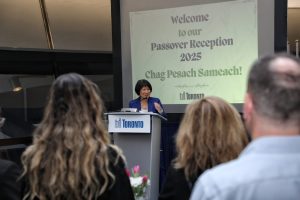TORONTO — Israel’s status as an internationally renowned leader in scientific research hangs in the balance due to cutbacks in government funding, warns Israeli Nobel Prize laureate Avram Hershko.
Israel’s status as an internationally renowned leader in scientific research hangs in the balance due to cutbacks in government funding, warns Israeli Nobel Prize laureate Avram Hershko.
Avram Hershko
“Relative to our size, we can still be proud of our achievements in science,” said Hershko – a Technion biochemist who shared the 2004 Nobel Prize in chemistry with Aaron Ciechanover, his former student, and Irwin Rose, an American – in an interview last week.
“But I’m worried about the future,” he added.
Hershko, a 71-year-old Hungarian Holocaust survivor who immigrated to the Jewish state in 1950 with his parents, lamented that Israel does not give sufficient priority to higher education and research. As a result, he suggested, Israel’s standing as a world power in a whole range of sciences has eroded.
“It won’t be good if current trends continue,” declared Hershko, who visited Toronto recently to attend the 50th anniversary celebrations of the Canada Gairdner Awards at the University of Toronto. “Israel will have to pay a high price. We won’t have too many Nobel Prize winners in the future,” he said.
Hershko, who arrived in Canada just weeks after Ada Yonath of the Weizmann Institute of Science shared the 2009 Nobel Prize in chemistry with two Americans, was the co-winner of the 1999 Gairdner Award, a coveted biomedical prize.
“It was my first major international award,” he said.
Subsequently, he won six more prizes, including the Albert Lasker Award for Basic Medical Research and the Wolf Prize in medicine.
“There was a domino effect after the Gairdner.”
In winning the Nobel Prize, the Nobel committee cited his work in the discovery of ubiquitin-mediated protein degradation. Ubiquitin proteasome pathways play a key role in maintaining the homeostasis of cells and are involved in the development and progression of diseases such as cancer and neurological and muscular diseases.
To Hershko, the ongoing cutbacks are supremely ironic, given the fact that Israel allotted infinitely more funds to basic scientific research many years ago, when it was a relatively poor country as compared to today.
Since the era of cutbacks started approximately a decade ago, Hershko has urged Israeli leaders from the prime minister on down to reconsider the policy.
“I’ve spoken about this many times, but we can’t get through to the politicians. We can’t make them understand the importance of higher education and research. They don’t know what’s important. They’re not leaders, like [former Israeli prime minister] David Ben-Gurion.”
The reductions have hit close to home.
Though his own funds have not been affected by the regime of fiscal restraint, the Technion budget has been cut by about 20 per cent, thus necessitating the elimination of academic positions.
“My research needs are met. The problem is that less famous faculty members have a hard time getting grants.”
Donors abroad have mitigated the overall impact of cutbacks, he observed.
“Without the help of overseas supporters, it would be a real catastrophe. We still need the support of the Jewish people. We don’t need more new buildings. We have to invest in young scientists.”
Cutbacks have also caused a brain drain of major proportions, Hershko pointed out, saying that a significant number of promising students do not return from their studies abroad.
“Israel’s future is in science and technology. We don’t have natural resources. Our main exports are in high tech, which is based on education. We can’t lose this edge. It’s our main strength.
“It doesn’t take a genius to understand that. I’ve explained this to government ministers. They say they understand, but nothing really happens.”
Nevertheless, Israel is still a centre of scientific innovation in such diverse fields as physics, chemistry, medical science and the computer and electronic sciences.
Hershko, who was accompanied to Canada by his wife, Judith, a retired biologist, has no intention of retiring despite having reached the Technion’s mandatory retirement age.
Despite his stature as a scientist, he must personally request annual extensions.
“I enjoy very much what I’m doing, in research and teaching. But there is more to do in my field, and as long as I can make progress, I will continue. I learn a lot by preparing new lectures, since they are based on new knowledge. I transmit knowledge, which is important.”
Life has changed somewhat for Hershko since the Nobel Prize.
“The first year was really bad. My life got disrupted quite a lot. I received so many speaking invitations and requests for interviews that I didn’t have as much time for my grandchildren.”
Hershko, who lives on Mount Carmel in Haifa, has since been far more selective. “I turn down 60 per cent to 70 per cent of invitations and accept three to four invitations to scientific meetings a year.”
Although he shies away from the limelight and is less than thrilled being a celebrity, he considers the Nobel Prize a signal honour and a source of pride, both to Israel and his family.
“But I don’t want to be a professional Nobel Prize laureate.”
Asked if he was concerned by the spectre of academic boycotts against Israel, Hershko replied, “They are contrary to the academic spirit.”
In a reference to its nuclear program, Hershko said, “What concerns me is Iran. Israel’s existence is still in danger, maybe more than in the past. We have to be able to defend ourselves. I’m definitely concerned about Iran.”
When asked whether Israel should strike nuclear sites in Iran, he said he could not discuss such weighty matters in public.






